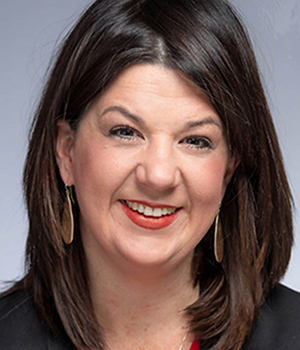Heather Reynolds to testify before Ways and Means Subcommittee on Work and Welfare
Heather Reynolds, the Michael L. Smith Managing Director of the University of Notre Dame’s Wilson Sheehan Lab for Economic Opportunities (LEO), will testify before the House Ways and Means Subcommittee on Work and Welfare on Wednesday (March 29). The hearing, “Welfare is Broken: Restoring Work Requirements to Lift Americans Out of Poverty,” begins at 2 p.m. and will be livestreamed via webcast here.
This hearing, which will be hosted by House Committee on Ways and Means Chairman Rep. Jason Smith and Work and Welfare Subcommittee Chairman Rep. Darin LaHood, will focus on the Temporary Assistance for Needy Families (TANF) program, including the program’s structure and effectiveness in lifting families out of poverty.

Reynolds was invited as an expert on poverty to speak from her experience in both the service provider and research spaces. LEO works with service providers across the country to build rigorous evidence for programs designed to move people permanently out of poverty. Prior to joining LEO, Reynolds spent 14 years as CEO of Catholic Charities Fort Worth, where she saw firsthand the disconnect that often exists between policy and on-the-ground work.
During her testimony, Reynolds will discuss the need for research-informed policy decisions by citing several LEO studies that demonstrate that the most effective way to help low-income Americans out of poverty is through pairing flexible financial assistance and case management. One example is Padua — a holistic case management program designed by Catholic Charities Fort Worth to address the unique assortment of barriers faced by families in poverty. LEO recently completed a randomized, controlled trial on Padua that showed Padua clients were 25 percent more likely to be employed, and unemployed individuals who were offered Padua services earned 46 percent more, were 60 percent more likely to be stably housed 24 months later and experienced a sharp decline in credit card debt that persists over time.
Reynolds will give examples of other such programs that have found similar success including the Bridges to Success program of Rochester, New York, which provides its low-income residents with economic mobility mentors that can help them coordinate community support services and move out of poverty one critical life issue at a time. Results from that study showed that participants, when compared to a control group, were more likely to be employed, with that trend continuing over time.
Reynolds’ testimony will emphasize how critical it is for policymakers to use evidence when making decisions about not only TANF, but anti-poverty programs across the board.
“At LEO, we have more than 90 research projects building evidence to help us understand what works,” Reynolds said. “We take the most creative leaders in this space and design research studies, studying the impact of their services. It is hard enough to run a social service agency and then add on top of that a research study. These organizations do it because they believe if they can understand their impact, it can be used to scale and replicate their work. Many of our provider partners serve TANF recipients who work and poor families who work but do not qualify for TANF. To get people to move out of poverty (whether that includes TANF or not), we need evidence-based programs that work.”
Contact: Tracy DeStazio, assistant director of media relations, 574-631-9958 or tdestazi@nd.edu
Latest Faculty & Staff
- Faculty receive prestigious early career awards from National Science FoundationDuring the 2024-25 academic year, four researchers in the University of Notre Dame’s Colleges of Engineering and Science received early-career awards from the National Science Foundation.
- In new research, Roy Scranton explores climate change and the limits of human progressIn his most recent book, “Impasse: Climate Change and the Limits of Progress,” Scranton, an associate professor of English, defines the impasse he sees as “not only political and institutional, but cognitive, existential and narrative” and asserts that the only path forward is through embracing what he terms ethical pessimism. “A lot of people confuse pessimism with nihilism, apathy and despair,” Scranton said. “But pessimism is actually about recognizing our limits, letting go of unrealistic goals, finding solidarity in the fact of human suffering and doing what you can now, not in some utopian future.
- Joule Bergerson, energy technology assessment expert, named new director of ND EnergyND Energy faculty director Joule…
- In memoriam: Alasdair MacIntyre, the Rev. John A. O’Brien senior research professor of philosophy emeritusAlasdair MacIntyre, the Rev. John A. O’Brien senior research professor of philosophy emeritus and a permanent senior distinguished research fellow at the de Nicola Center for Ethics and Culture, died on May 21, 2025. He was 96.
- Santiago Schnell, dean of Notre Dame’s College of Science, appointed as provost of DartmouthSantiago Schnell, the William K. Warren Foundation Dean of the College of Science at the University of Notre Dame, has accepted an appointment as provost at Dartmouth College. He will depart Notre Dame at the end of June and begin his new role in July.
- Notre Dame’s Fightin’ Irish Battalion receives Department of Defense award as nation’s top Army ROTC programThe United States Department of Defense honored the University of Notre Dame’s Army ROTC Fightin’ Irish Battalion as the nation’s top Army collegiate program for the 2023-24 academic year. This will be the first time the unit has received the department’s Educational Institution Partnership Excellence Award, which recognizes the program’s achievements in recruiting, educating, training and commissioning leaders of character to be the next generation of military officers.












